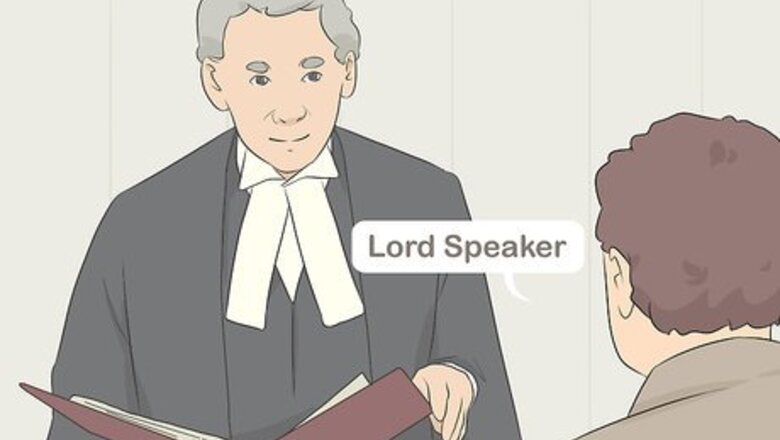
views
Addressing Members of the House of Lords
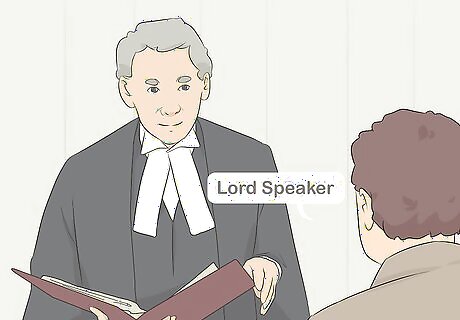
Address the Lord Speaker as “Lord Speaker.” The Lord Speaker is the speaker in the House of Lords in the parliament in the UK. They are to be addressed only by their title. For written correspondence, such as an email or a letter, you would start with "Dear Lord Speaker." This applies to all members of the House of Lords; you just put "Dear" in front of their proper title for formal correspondence. If you make a request, close the letter with a thank you and include your name. To address the envelope on a letter to the Lord Speaker, you also need to include “The Right Honorable the,” followed by “Lord,” their surname, and “Lord Speaker.” For example, the current Lord Speaker is Normal Fowler, so the envelope would say: “The Right Honorable the Lord Fowler, Lord Speaker.”
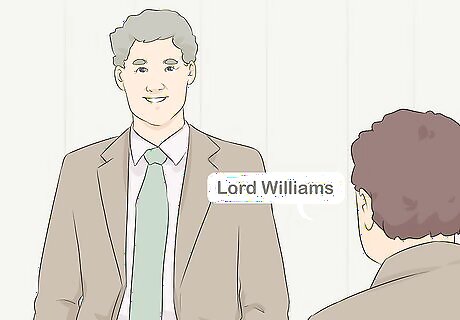
Call certain members “Lord” or “Lady” followed by their surname. Use “Lord” for male members of the House of Lords who hold the title of Baron, Earl, Marquess or Viscount. Use “Lady” for female members of the House of Lords who hold the title of Baroness, Countess, or Lady.Tip: There are some exceptions to the rules and Lords and Ladies with special titles. You can find a full list of members of the House of Lords with their titles here: https://members.parliament.uk/members/Lords. For example, say “Lord Williams” or “Lady Jameson.” If you are addressing an envelope to a Baron or Lady, include “The Right Honorable the” in front of their title. For example, “The Right Honorable the Lord Williams” or “The Right Honorable the Lady Jameson.” If you are addressing an envelope to an Earl, Marquess, Viscount, or Baroness, use special titles instead of “The Right Honorable”. Here are some examples of how you would write the special titles: “The Earl of London,” “The Most Honorable the Marquess of Sherwood,” “The Viscount Johnson,” and “The Baroness Tokyo.”
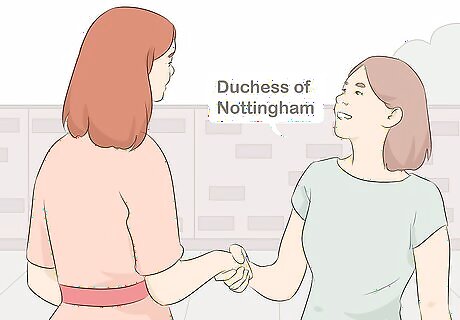
Address Dukes and Duchesses using only their title. Dukes and Duchesses are to be addressed by their full title which includes the name of the place they hold the title. Don’t use “Lord” or “Lady.” For example, say “Duke of Earl” or “Duchess of Nottingham.” To address an envelope to a Duke or Duchess, you need to start with “His Grace the” or “Her Grace the.” For instance, “His Grace the Duke of Earl” or “Her Grace the Duchess of Nottingham.”

Call archbishops and bishops by their special titles. High-ranking members of the Church of England are also permitted to sit in the House of Lords. Bishops are addressed as “Lord Bishop” and archbishops are simply addressed as “Archbishop.” To address an envelope to an archbishop, write, for example, “The Most Reverend and the Right Honorable the Archbishop of Canterbury.” For bishops, write, for instance, “The Right Reverend the Lord Bishop of Brighton.”
Using Lord to Address Judges
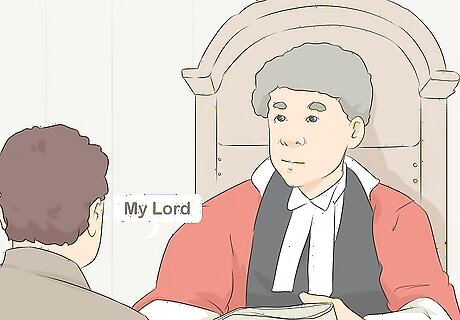
Call all judges “My Lord” or “My Lady” in Court. Always refer to judges as “My Lord” or “My Lady,” depending on their gender, when speaking to them in court. It doesn’t matter if their official title includes “Lord” or not.Tip: This is comparable to calling judges “Your Honor” in the United States. It’s important to always do this to show respect towards the judge that is presiding over the courtroom.
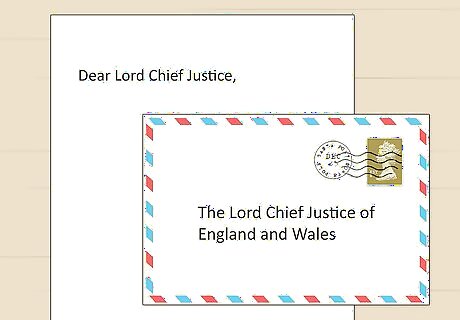
Address the Lord Chief Justice of England and Wales by their title in writing. Always start written correspondence to the Lord Chief Justice of England and Wales with “Dear Lord Chief Justice.” You don’t need to include “of England and Wales.” When you address a high-ranking person, you should use their title. You do need to write their full title on the address on an envelope, which is “The Lord Chief Justice of England and Wales.”
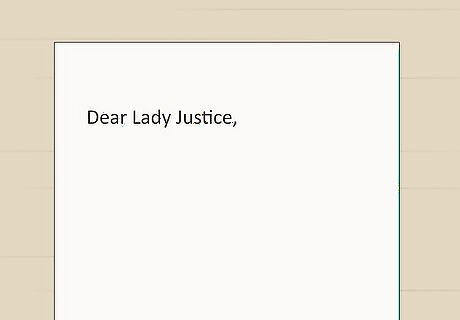
Use “Lord” or “Lady Justice” when writing to Court of Appeals judges. Judges who preside over the Court of Appeals have the title of “Lord Justices of Appeal.” Address a male Court of Appeals judge as “Lord Justice” and a female Court of Appeals judge as “Lady Justice” in emails or letters. When speaking to these judges in court, you still only have to say “My Lord” or “My Lady.”
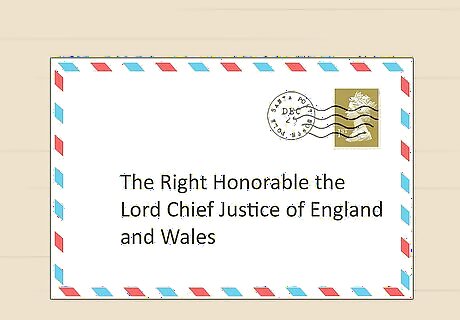
Address envelopes to “The Right Honorable the” followed by the judge’s title. This applies when writing to any judge. They do not have to have a title that includes “Lord” or “Lady.” For example, “The Right Honorable the Lord Chief Justice of England and Wales.” An example of a different judge’s title written on an envelope is “The Right Honorable the Chancellor of the High Court.”
Addressing a Lord Mayor or Lady Mayoress
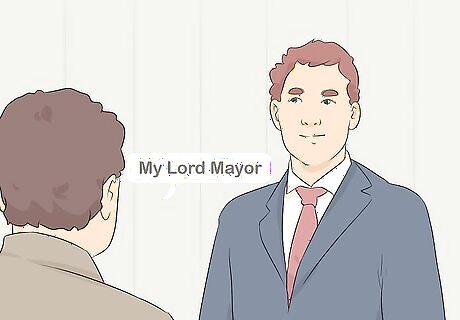
Say “My Lord Mayor” or “My Lady Mayoress” in person. The Lord Mayor or Lady Mayoress is to be addressed as such at all times when they are wearing the chains or badge of mayor. Use this when formally greeting them in person. To begin a letter, you can either write “My Lord Mayor” or “My Dear Lord Mayor.” Add “and Lady Mayoress” if you are writing to both of them Lord Mayor or Lady Mayoress is a title given to the mayor of London and mayors of other big cities in the UK. It is not typically given to mayors of smaller cities.
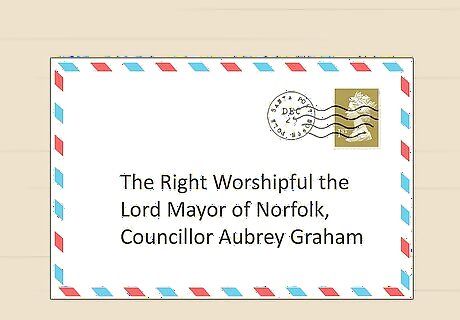
Use the Lord Mayor’s full title when addressing an envelope or in a speech. The full title begins with “The Right Worshipful the Lord Mayor of,” followed by the name of the city they are mayor of, and ending with their name preceded by “Councillor”. Use this on the front of an envelope or when addressing the Lord Mayor at the beginning of a speech.Tip: In some cases, Lady Mayoresses do not have “The Right Worshipful” in their titles. In other cases, both females and males are both to be addressed the same. You can check the government websites for specific cities online to see how they prefer their mayor to be addressed. For example, “The Right Worshipful the Lord Mayor of Norfolk, Councillor Aubrey Graham.”
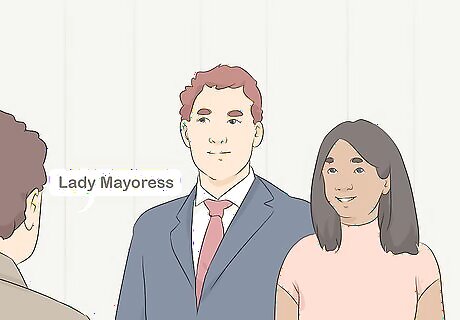
Refer to female companions of Lord Mayors at events as “Lady Mayoress.” This applies to any female companion, such as their wife or daughter. You can either say “Lady Mayoress” or “My Lady Mayoress” when you are speaking to them in person. If the Lord Mayor’s companion is male, they are typically referred to as “Consort.” This also applies to male companions of Lady Mayoresses.




















Comments
0 comment